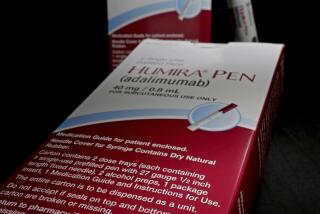Generic-Drug Makers Face a Big Year
- Share via
NEW YORK — Makers of generic drugs are gearing up for a big year as blockbuster brand-name medicines such as Zocor, Zoloft, Pravachol and Ambien are set to lose U.S. patent protection.
But analysts caution that stocks in producers of cheaper versions of those drugs are not sure bets.
Many stocks in generic-drug makers already had a strong 2005 ahead of the opportunity -- notably Teva Pharmaceutical Industries Ltd., Ivax Corp. and Barr Pharmaceuticals Inc.
In addition, analysts said, some companies were in better shape than others to pounce on the wellspring of patent expirations through their size or ability to ward off competition.
“It’s not nearly as simplistic as saying 2006 will be a big year,” said Ken Cacciatore, an analyst with SG Cowen & Co. “You need to look within each company’s pipelines and see which companies are best-positioned to capitalize.”
Increased competition has made the generics environment more difficult, said Banc of America Securities analyst David Maris.
“While several products are expected to go generic in 2006, there are many more competitors today than there were three years ago,” he wrote in a recent research report.
Merrill Lynch & Co. analysts estimated that drugs with more than $22 billion in annual U.S. sales could face first-time competition from generics in 2006, about double that of 2005.
Competition is seen for some of the most popular medicines: cholesterol fighters such as Merck & Co.’s Zocor and Bristol-Myers Squibb Co.’s Pravachol, as well as Pfizer Inc.’s antidepressant Zoloft and Sanofi-Aventis’ sleep aid Ambien, among others.
Investors may have already missed the boat. Susquehanna Financial Group analyst Amy Stevens said stocks of generic-drug makers typically had risen the year before a peak period for patent expirations -- in this case, 2005 ahead of 2006.
Stevens forecasts that stocks of generic-drug makers may outperform the broader market in the first half of the year, but then “people are going to want to move out of the space” as they note that 2007 will be a relatively down year for patent expirations.
By being first to file patent challenges to branded drugs, manufacturers can gain 180 days during which they are the only generic seller in the market once the patent expires. Otherwise, many sellers of generics can rush in upon patent expiration.
Israel-based Teva, one of the largest makers of generic drugs, stands to gain many of the 180-day rights in part through its $7.4-billion acquisition of Ivax, expected to close Jan. 12.
Teva is expected to have such rights for Pravachol and prostate drug Proscar. On Sunday, Teva said it had received tentative U.S. Food and Drug Administration approval to sell a generic version of Zocor.
With its acquisition of Ivax, Teva would seem “the best-positioned to capture the large opportunities in 2006,” Cacciatore of SG Cowen said.
Teva also is seen as well-placed for this year because of its size, which gives it negotiating leverage to gain contracts with big purchasers of generic drugs, such as drugstore chains and pharmacy benefit managers, which broker deals with manufacturers for their customers.
Size could similarly benefit other large generic sellers such as Mylan Laboratories Inc. and Watson Pharmaceuticals Inc. of Corona.
Stevens also likes Teva’s solid branded business specializing in neurological drugs, and she notes that the drug maker is prepared for the potential surge of so-called generic biologic drugs, such as growth hormone and anemia treatments.
However, Teva already has proved to be an investor favorite. Its shares gained 44% last year.
Stevens also positively rates Barr, whose shares rose 37% in 2005. One reason she likes the company is that it stands to access 180-day exclusivity opportunities that include Sanofi’s Allegra D and Shire Pharmaceuticals Group’s Adderall.
“They have one of the strongest intellectual property positions for their size in their space,” Stevens said.
More to Read
Inside the business of entertainment
The Wide Shot brings you news, analysis and insights on everything from streaming wars to production — and what it all means for the future.
You may occasionally receive promotional content from the Los Angeles Times.










